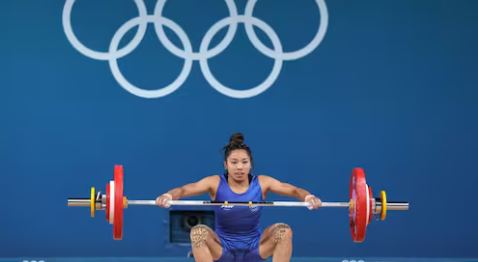Why Mirabai Chanu might not have felt at her best during the Olympics in Paris is a relatable situation for many women. The physical effects of menstruation are detrimental, and female athletes may face additional difficulties.
In a matter of seconds, millions of hearts were broken when Saikhom Mirabai Chanu failed to win an Olympic medal by a mere kilo. In the women’s 49 kg weightlifting competition at the Paris Olympics 2024, she finished fourth due to a failed lift.
Even after the devastating defeat, Chanu maintained her positive attitude and told reporters that she was happy with her performance.
Additionally, she disclosed that, at the time of the competition, she was on the third day of her menstrual cycle—a fact that women everywhere would understandably find challenging.
Periods are a fact of life for all people who menstruate; they are never an excuse. Menstruation is significantly more complicated, and the difficulties are even bigger for female athletes. It’s not only about the three to five days of flow.
Sports performance CAN be impacted by menstruation.
Dr. Anjana Singh, director of obstetrics and gynecology at Fortis Hospital in Noida, tells India Today that “fluctuations in female sex hormones have been associated with changes in inflammation, metabolism, muscle activation, and body composition, which can influence athletic performance.”
According to her explanation, inflammation rises after ovulation and peaks during the menstrual cycle. Many female athletes consider their performance to be inferior at this peak.
The director of obstetrics and gynecology at CK Birla Hospital in Gurugram, Dr. Astha Dayal, adds, “Every lady has a unique experience with their menstruation. Some find it easy, painless, and pleasant, but others find that the flow, pain, or symptoms of PMS are so bad that it negatively impacts their quality of life. Women who exercise frequently, such as athletes, typically experience improved symptoms, although in some circumstances, it may have a variable impact on their performance.”

In addition, Dr. Singh discusses the various stages of the menstrual cycle, saying that the follicular phase, which starts on Day 1 of the period and lasts for roughly two weeks, is the low hormone phase. Oestrogen and progesterone levels are low during this phase, and a woman’s exercise physiology is more like a man’s than it is at any other point in the cycle.”
During this stage, the body is ready to perform at its best and store and use carbohydrates as fuel. A woman has more energy and is able to build strength more easily. Hydration is at its ideal level, and recovery occurs more quickly.
Contrary to popular assumption, the onset of menstruation actually improves performance since it causes hormones to drop, giving you more energy.
In the meanwhile, ovulation begins on Day 14. Progesterone levels are low at that period, while those of estrogen and testosterone are elevated.
Depending on the duration of the cycle, the luteal phase can last up to day 35 and occurs between days 14 and 24. Here, levels of oestrogen and progesterone are elevated, particularly in the final week preceding the commencement of menstruation.